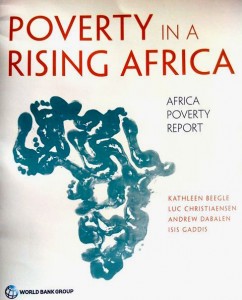Poverty in Africa – percentages down but numbers up
 The percentage of Africans living in poverty has gone down since 1990 but the numbers have gone up due to population growth, World Bank President Jim Yong Kim said in Accra on Friday, October 16.
The percentage of Africans living in poverty has gone down since 1990 but the numbers have gone up due to population growth, World Bank President Jim Yong Kim said in Accra on Friday, October 16.
Dr Kim who was in Accra to launch a World Bank report “Poverty in a rising Africa” as part of activities to mark ‘End Poverty Day’, remarked that the news concerning poverty in Africa over the past two years “is both encouraging and sobering.”
“Half of all people living in extreme poverty live in Africa. Compared to 1990, the percentage of people living in poverty in Africa has dropped significantly but the overall number of people living in extreme poverty has gone up 63 million”, he said.
Dr Akinwumi Adesina, the President of the African Development Bank (AfDB) said the story of a rising Africa “not a complete story” though Africa is rising and is home to six of the ten fastest growing economies.
He noted that while there is growth in Africa, the growth “is underlined by high inequality within countries and between countries” and while the percentage of the poor in Africa has reduced, the absolute number of poor people in Africa has risen from 175 million in 1990 to 330 million by 2014.
“That means that Africa accounts for over one-third of all the extremely poor people in the world. Global poverty is basically one with an African face.”
“Africa must not have comparative advantage in poverty and Africa must not become a museum of poverty,” he said.
Dr Adesina said efforts to reduce poverty must focus on raising productivity in agriculture by treating it as a business, and focus on addressing the continent’s energy shortfall.
According to him, over 620 million Africans do not have access to electricity and the poor in Africa pay 20 times more for energy than in developed countries. About 700 million on the continent also do not have access to clean cooking energy
“Without energy, micro, small and medium-sized enterprises which account for over 90 per cent of our businesses operate below capacity, industrialization is stalled and Africa loses, 2 to 4 per cent of its GDP.
Africa is simply tired of being in the dark. If we get power right we will get everything right in Africa,” Dr Adesina said.
He said African leaders must also work hard to reduce the sources of fragility as it is also one of the major reasons for slow progress in poverty reduction, as captured in the report: between 1996 and 2012, poverty rate declined 100 per cent in non-fragile states compared to fragile states.
By Emmanuel Odonkor
